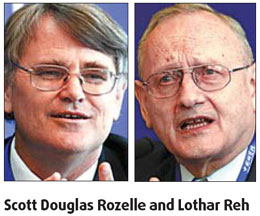Scientists win award for pioneering collaboration
By Lin Shujuan (China Daily)
Updated: 2008-03-27 07:32
Updated: 2008-03-27 07:32
Scott Douglas Rozelle and Lothar Reh are both scientists but their disciplines are as different as chalk and cheese - the only thing in common is their long association with China.
Yesterday, they had another thing in common when they became winners of the Award for International Cooperation in Science & Technology.
Presented by the Chinese Academy of Sciences, the awards - given for the first time - recognize their contributions to China's international cooperation in science and technology over the past decades, said Lu Yongxiang, CAS president.

Speaking fluent Chinese, Rozelle - from Stanford University and an agricultural economist who has been involved in rural development research - attributed his strong interest in China to his father who spent six months in Shanghai in 1945.
"My father used to tell me that China would one day become an important player on the international arena," said Rozelle.
He took his father for his word and started learning Chinese in 1966; and when he became an agronomist in the late 1980s, chose China for his focus of research.
Since 1995, Rozelle has collaborated with the CAS' Institute of Geographical Sciences and Natural Resources in conducting research on China's agriculture and rural development.
Over the years, he spent four to five months annually in the country, visiting villages, doing research and giving lectures to fellow scientists and university students.
He has published dozens of theses and reports on China's agricultural development and rural reform, among which is the report "Why China will not Starve The World" co-authored by him in 1996.
"He has made outstanding contributions to promoting academic research in China's agricultural economics and policy, improving the world's understanding about China's rural reform, and fostering young scientists for the institute," Lu said.
Looking back, Rozelle said it was "all pleasant" even in the remotest and poorest village of China since "all Chinese are excellent cooks."
"China has entered a special era when its environment for scientific research and development has never been better," said Rozelle, also a winner of a Lifetime Achievement Award bestowed by the American Economics Association.
Reh's first contact with China dates back earlier than Rozelle's, to 1975, when he gave a lecture at an industrial exposition in Beijing.
Reh, from the Swiss Federal Institute of Technology (ETH Zrich) is a pioneer in the development of circulating fluidized bed (CFB) technology, which has been widely applied in the combustion of solid fossil fuels, particularly in the power generation industry for pollutant emission control.
He has been facilitating cooperation between China and Europe in the research, development and industrial application of the technology.
One of his efforts is the joint research cooperation agreement signed in 1998 between the CAS' Institutes for Process Engineering (IPE) and ETH.
Recalling his first impression of Beijing in 1975, Reh said it was an airport surrounded by extensive farmland and home to a sea of cyclists.
Over the past three decades, while Beijing has developed into an international metropolis, Reh said he is happy to see that sustainable development has been included as part of China's national development plan.
Reh, 77, said he will press the message of energy efficiency and environmental protection to the younger generation.
|
||
|
||
|
|
|
|